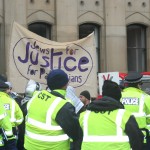 Where to begin. I have about a dozen blog articles and some newspaper articles about the fallout resulting from Mick Davis’s statements almost a fortnight ago now.
Where to begin. I have about a dozen blog articles and some newspaper articles about the fallout resulting from Mick Davis’s statements almost a fortnight ago now.
I have kept my powder dry because the questions raised are complex and lead off into many different avenues.
So first, for the uninitiated, who is Mick Davis and what did he say that has so divided the Jewish community in Britain?
[And even that statement is problematical; to say he has divided the Jewish community, maybe the affair has simply brought out into the open an existing schism. And when I say ‘Jewish community’ that is shorthand for the majority Jewish establishment, mainly conservative and mainly supportive of Israel. It does not include those Jews who have already picked up their camp standard and moved it over to the left and the pro-Palestinian side, yet still consider themselves to be the true representatives of British Jewry.]
Mick Davis is a South African-born businessman who heads up the UJIA (United Jewish Israel Appeal), the leading fundraising organisation in Britain for Israel (although it also supports domestic Jewish charitable ventures). I worked briefly for its predecessor, the JIA in what is now called a gap year, back in the seventies, but that’s another, albeit interesting, story.
Mick is also a luminary of the JLC, the Jewish Leadership Council. This is, apparently, a self-appointed group of, mainly wealthy and influential community leaders of all affiliations and has the following Mission:
Mission
1. Enhance the effectiveness of communal political representation, advocacy and relations with Government.
2. To influence communal strategic priorities.
3. To demonstrate the community’s desire for greater strategic coordination and cooperation.
Just who gives them the right for such a mission is uncertain. Let’s just say they abrogated that right for themselves as a group of well-meaning oligarchs, a sort of secular sanhedrin. But more on this later.
Mick Davis is, therefore, a wealthy man who wants to help Israel and the Jewish community in Britain. The UJIA is a charity and, I presume, its trustees appoint its leader rather like the BBC appoints its Director General. Remember that Davis is also one of the aforementioned ‘oligarchs’.
At the now infamous meeting Davis is reported to have said the following:
1. If you try to characterise the leadership of the Jewish community…you would probably find most of them are left of centre in thinking about Israel, that they strongly support a two-state solution, they are worried about the rights of minorities.
Not too controversial, except it is an opinion not backed up by any direct evidence that I am aware of. He is probably right as he knows many of the leaders of the community but he is already overreaching here in claiming opinion as fact.
2. I think you have a left of centre leadership with a genuine concern about minority issues, concerned about the moral dilemmas that we face, concerned about where Israel goes, but it’s a leadership which has never, ever spoken up publicly about that.
Not to mince words, he is saying that the leadership, which he again claims to know, are troubled by many of Israel’s actions and ‘minority issues’, which presumably refers to Israeli Arabs and, perhaps, Palestinians. He says the ‘we’ face moral dilemmas. By ‘we’ I assume he means British Jewry and I assume the moral dilemmas are, as he appears to imply, the occasions when Israel acts in a way that he/the leadership do not agree with but feel constrained not to speak up against.
Of course, this implies that he and the Jewish leadership, nay, the Jewish community has the right to speak up; and if it has that right, it has a moral duty to express disagreement.
This is one of the points which has caused most controversy and debate. I shall return to this later, too.
3. Additional building on settlements, or the bulldozing of houses of people in circumstances which just doesn’t seem to be morally conscionable… forcing non-Jews to take an oath about the nature of the Jewish state…the fact that many Arab Israelis live in circumstances of extreme poverty – that is not to say some Jewish Israelis don’t either – and have a second class service delivery from the state.
Well now the genii is truly out of the bottle. Davis has here done the unthinkable and directly criticised a number of policies both of the present Israeli government and previous governments. House demolitions and so-called settlements are not just the province of this current government, but are on-going policies stretching back decades. The oath of allegiance issue is definitely a policy of the present government whilst Arab poverty and second-class citizenship accusations are a statement of concern about the nature of Israeli society.
Davis’s line here, having established the left-leaning credentials of the leadership, is now aligning worryingly with the rhetoric of the far Left. Although none of the issues he names can or should be denied, they are all mentioned without context.
To berate Israel for the ‘additional building on settlements’ is the Obama line. It fails to spot the fact that before Obama made settlements a grand excuse for the Palestinians to avoid talks, they had never in any previous negotiations, even with Arafat, been seen as an impediment to peace.
I have never liked bulldozing homes because they were once or are the family home of a terrorist. I have no choice but to agree with Davis on this one.
The oath of allegiance also troubled me. That is, until new Jewish citizens were included in the bill. The oath is one of those Israeli specialities, creating problems where there is no need. The Israeli constitution is clear on the nature of the state. I see no reason for anyone to do any other than swear allegiance to the State of Israel and its constitution. Expressing the Jewish nature of the state in such an oath is redundant and just gives food for enemies to chew on. Yet, it is a minor issue.
Why does Davis say that Israel is ‘forcing’ non-Jews to take the oath which is a further misrepresentation of the facts. The oath is intended for all NEW citizens and no-one is forcing them to become Israelis. In the US new citizens give their allegiance to the flag, the constitution and American values. Where’s the difference?
The issue of Arab ‘extreme’ poverty whilst acknowledging there is Jewish poverty, is a strange one for me. I agree there are inequities and many of these are cultural and historical but there are many wonderful examples of Arab integration and success.
What is most egregious about this is that it ignores the fact that Israeli Arabs are, in general, better off than their counterparts in the surrounding countries. I see no issue with the UJIA joining in efforts to raise the status, education and medical well-being of Israel’s Arab population but Davis makes it sound as if the situation is deliberate and one of neglect. It’s a context-free zone, the sort of easy point-scoring that Israel’s enemies are only too happy to use against it. And how does he measure ‘extreme’ poverty?
4. Those are issues that ideally we would like to talk about…but you are fearful of doing that, because you then suddenly say: ‘Well, is it possible that those things will get picked up and woven into the debate of the delegitimisers and present a platform from which they then grow in strength?’
Well, not quite. It depends how you address the issues or perhaps, whether they are actually any of your business. Which is also a question arising from this whole debate. The question is: is it possible to have a free and frank discussion on Israel’s shortcomings in a climate of delegitimisation and demonization? Here’s the moral dilemma: if you believe you are morally obliged as a member of the British Jewish community to speak out against perceived injustices, how to you square that with the fact that, (and especially if you are a communal leader, self-appointed or otherwise), your words can be used as ammunition to denigrate Israel?
Some have questioned that anyone in the Diaspora has any right at all to criticise Israel.
5. In Europe, and this country in particular, there is a strong sense amongst the leadership, and I guess most of the community, that there is a concerted effort to delegitimise the state. Not to attack Israel’s policies, but actually question whether the state as a Jewish state should exist.
Precisely. And that’s why, maybe, as a community leader, you should be a bit more circumspect when it comes to contextualising perceived inequities in Israeli society or government policies. Or maybe not?
Where Davis drew most flak was a direct criticism of Israeli Prime Minister, Binyamin Netanyahu.
6. I object to the fact that Netanyahu hasn’t got the courage to take the steps that he would like to take. I think he would like to be seen as the person who makes the great advance…He is a prisoner of the past and a prisoner of the circumstances that he finds himself in. I don’t understand the lack of strategy in Israel.
Some commentators have leapt to Bibi’s defence citing his army service in response to accusations of physical courage. This is a ludicrous response. Davis was talking about moral courage, not physical courage. But this doesn’t make Davis right. What steps does he think Bibi wants to make? What is the great advance? Why does Davis imply here that lack of progress in peace negotiations is due to Netanyahu’s lack of courage? Is he suggesting that he is in thrall to the religious right over settlements? What lack of strategy? The strategy to defeat its enemies and not give in to pressure from the United States to commit suicide, perhaps.
It is at this point that any sympathy for Davis’s position begins to erode, if you have any, that is. What does a philanthropist know about what it is like to make day to day decisions as the Israeli Prime Minister? I think he is wrong about Bibi. I’m not a fan of this current Israeli government but it seems to me Netanyahu has walked a difficult line between appeasing an aggressive and frankly stupid US administration and holding together his coalition.
Davis, in apparently holding Bibi to account for failure to move the peace process forward, completely ignores the real culprits: the Palestinian Authority lead by Mahmoud Abbas which has been greatly assisted by Obama’s naivety in maintaining the long tradition of Palestinian rejectionism.
And now we come to the really bad bit.
7. If… the world community no longer believes that a two-state solution is possible, we de facto become an apartheid state because we then have the majority who are going to be governed by the minority.
Israel is not today an apartheid state… Even though we have things that are entirely offensive to us passed in the Knesset, those things come from tactical issues rather than from anything else and do not represent the mainstream of Israeli society. We still have wonderfully fertile ground to build the moral nation that we want to have.
First, what’s with the ‘we’? Davis is not an Israeli.
Second, to use the apartheid analogy, even for a putative future situation, and even immediately correcting this by saying Israel is not ‘currently’ an apartheid state, is to use the language of every Israel-hater, every Hamas apologist and every Guardianista left-wing anti-Zionist. No Jewish leader should place the words ‘apartheid’ and ‘Israel’’ in the same sentence let alone a South African of an age to know better.
There are so many things wrong with this whole statement. What Davis is saying is that if there is to be no two-state solution, then Israeli Jews will inevitably become a minority west of the Jordan. However, this ignores the fact that Israel has not annexed the West Bank and is increasingly handing over responsibility for its administration to the PA.
Furthermore, why does minority rule have to equate to apartheid? Apartheid is surely something quite different from simply a minority group ruling a larger one. And in any case, how would this come about? I don’t recall a single Israeli administration ever arguing for an annexation of the West bank.
Apparently Davis is using the royal ‘we’ when he says “we have things that are entirely offensive to us passed in the Knesset”. So what? Why does the Knesset have to avoid offence to Davis?
Then another truly unforgiveable utterance:
8. We still have wonderfully fertile ground to build the moral nation that we want to have.
So Israel is not a moral nation and he and the JLC will put Israel on the path of righteousness. The chutzpah of the man. Considering its history and its genocidal neighbours, Israel is more moral than it has any right to be.
We now come to another statement that really put the backs up of many in the community and outside:
9: I think the government of Israel …have to recognise that their actions directly impact on me as a Jew living in London. When they do good things it is good for me, when they do bad things, it’s bad for me. And the impact on me is as significant as it is on Jews living in Israel… I want them to recognise that.
What! Ok, it is true that Israel’s actions can directly impact me as a Jew living in the UK. During Cast Lead and after the Mavi Marmara incident, as I walked to the synagogue on Saturday morning, I felt a little more vulnerable than at other times. But why? Simply because I am aware that anti-Semites will find little excuse to attack Jews. Did I blame Israel? Not in the slightest. Why should I blame Israel for the anti-Semitism of others?
So why should Davis outrageously state that Israel has to worry about his levels of comfort? Davis’s attitude is somewhat patronising toward Israel. He appears to be over-identifying. Again, more commentary from others later.
10: I think there is not only amongst young people but quite a few Jews in this country a desire to see a discussion take place which echoes views about Israel which address the current dilemmas, without wanting to at the same time be attacked and labelled as a self-hating Jew.
Well, here at least, I can see that Davis is well aware of the controversial nature of what he just said and pre-empts the unthinking chorus of those that would label anyone who doesn’t agree with their particular viewpoint on Israel as a self-hating Jew. I would not accuse him of that; far from it. I would accuse him of being somewhat arrogant and tactless.
So there we have it. The ten utterances, the Davis version of aseret hadibrot.
The fallout from these ten utterances is instructive. It asks of us the following questions – in no particular order as they say on all the best TV talent shows.
1. Is it ever permissible for an Israel supporter in the Diaspora to criticise Israel, and if so, when? If Israelis can criticise, why not Diaspora Jews?
2. If it is permitted to criticise under certain circumstances, where is the lines to be drawn? I think this leads to a reductive argument which I’ll discuss later.
3. Is there a real schism in the Diaspora now, not only between left wing Jews such as those who join Jews for Justice for Palestinians or join flotillas to break the blockade of Gaza or who attack Israel in the columns and commentaries of the Guardian, but also in mainstream, conservative Jewry?
4. Are we splitting up along the fault line of the New Israel Fund and Jewish Voice for Peace and their ilk on one side who represent a left of center view and the right wing on the other who view the NIF with suspicion and accuse it of colluding with the enemy.
5. Why do we need, in the UK, the Board of Deputies, the United Synagogue, the Office of the Chief Rabbi, the Zionist Federation, the Jewish National Fund, the UJIA, regional Rep Councils, Habonim, Bnei Akiva, the Federation of Zionist Youth and the JLC and many other charities and community organisations, when there are in ganzen only 300,000 identifying Jews in the UK? Why are we led by rich oligarchs who are not elected, not accountable and seem to come from another era? Why do we have so many machers?
6. Why do those professing Zionism and great love of Israel and dedicate their lives to Israel not go and live there?
Isn’t it wonderful how one person and his remarks can cause such repercussions? Only in the Jewish community perhaps.
Let’s now look at the fallout and how it addresses some of these questions.
One of the first into the fray was Samuel Hayek, a fellow JLC member and chairman of the JNF. He was reported in the Jewish Chronicle as saying categorically that “diaspora Jews should never criticise Israel”
Jonathan Hoffman, vice-chair of the Zionist Federation and a fearless activist for Israel gathered a petition which criticised Mick Davis in the following terms:
Most of Mick Davis’ reported comments were either incoherent or indicative of a breathtaking lack of knowledge and understanding. To imply as he did that only the Left is concerned about minority issues is ludicrous, as is suggesting there is no strategy in Israel (is he even aware of Bibi’s speech at Bar Ilan in June 2009?) and suggesting that anything short of a Palestinian state amounts to “apartheid”.
…
But the crassest comment was to suggest that Netanyahu’s policies have as much impact on Davis – sitting in London – as on Jews in Israel . We were not aware that Hampstead is within target of Iranian or Hamas missiles, nor that its residents have to send their children to defend the Jewish State for three years. However much philanthropists give to Israel , it is a thriving democracy and they cannot buy political control, just as donors to Universities cannot buy academic control. We are not shareholders in Xstrata (the mining company which Davis heads). Are we entitled to a say in its policies? Of course not. If Davis wants to become an Israeli politician, he should start by making Aliya and voting.
And if Israel ’s policies make Davis uncomfortable at the golf club, let him acquire the knowledge and pride to defend a democracy under fire. If he is unwilling, he is not fit to be a communal leader and should resign (unfortunately he cannot be voted out as he was never elected in the first place).
Which in typical combative Hoffman mode is very much as I see it. But it also adds the accusation that those with money, or who raise a lot of it, are under an illusion that that gives them the right, sitting comfortably or uncomfortably, as they do in Blighty, to attempt to dictate policy to Israel.
Hoffman’s views were not, however, mirrored by his leader Harvey Rose who said he agreed with much of what Davis had said and added:
“How Israel is perceived in the UK has a direct bearing on our comfort levels in Britain. It troubles me that so many people place the blame entirely on Israel.”
Which I am still trying to decipher. But Rose, too it seems, believes that his comfort levels are as important as Israel’s survival. I would have expected a more forthright defence of Israel from the leader of the ZF. It appears that Mr Rose is on the left of the fault line that I and others see opening in the UK Jewish community.
Even Rose’s stalwart Manchester ZF leader, Joy Wolfe said:
I am reluctant to criticise a fellow Zionist leader. But I strongly disagree with his concern that what Israel does should take into account its impact on Jews outside of Israel. Israel has to do what is right for Israel
So not reluctant at all, Joy. Clearly, veterans in the community are used to having to take sides. Times are a-changing, it appears.
A more traditional view came from Brian Kerner, who used to have Davis’s job as reported by Simon Rocker in the JC:
although “broadly supportive” of Mr Davis’s views, he was against voicing them in public because “it’s only picked up by our enemies, distorted and used against us”.
This is, perhaps, the most hypocritical standpoint possible: ‘I agree with you but I admit it can hurt Israel, so keep shtum.’
It’s impossible to keep shtum in the 21st century as Wikileaks testifies. As I have already said that Davis’s words can be used by Israel’s enemies you would think I would agree with Kerner. My point is slightly different in that all of us who profess to support Israel, if we are to criticise at all, must contextualise that criticism in light of history and the ongoing existential struggle which is taking place right now.
I am somewhat attracted by the view that criticism can be left for later; now is the time to stand behind Israel, but there must be some point at which anyone would criticise, even Israel’s ‘best friends’.
This is the reductive argument I mentioned earlier. Let’s say someone says it is never permissible to criticise Israel, as Samuel Hayek has said. Let’s take an extreme case: a right-wing religious party takes control of Israel and begins to drive out Arabs from Israel and the West Bank. Now, before you start shouting at me, I don’t believe this would ever happen. I am just making a philosophical point. Surely, any real supporter of Israel and any Jew worth his moral salt would protest vigorously to change the policy of the Israeli government.
So by this reductive argument, we then imagine a slightly less worse case scenario. Would you criticise then? It reminds me of the so-called Ground Zero mosque argument which says that two blocks is too close. So what about two and half? Three? At what point would a mosque be permissible? And at what point would criticism be permissible? The answer is that if you allow for the extreme case, then surely, it is always permissible to criticise because it is impossible to draw any precise line beyond which it becomes wrong to do so.
Samuel Hayek again:
If diaspora Jews want to criticise Israel legitimately, there is one simple solution: make aliyah and express your views at the ballot box.
Yet Lord Janner says:
Sadly, in recent years, much has changed about Israeli society. Fundamental red lines are being crossed that threaten to undermine what many of us have worked so hard for. As a Jew and as a proud Zionist, this deeply troubles me.
I accept, of course, that all Jews should robustly and proudly defend the rights of Israel as a Jewish State, and that all Jews should celebrate Israel’s great achievements since 1948. I have always proudly spoken out for Israel over the many years of my communal …
service – and publicly defended her, when she has been under attack, whether in the House of Commons, the House of Lords, and in the media, or even in the United Nations. And I shall continue to do so.
…
Sadly, I have recently seen actions by this Israeli Government which have departed from the high moral purpose enshrined in Israel’s Declaration of Independence, which I proudly remember my hero and friend David Ben-Gurion signing. I cannot be silent when I know of unequal treatment afforded to some of Israel’s minorities and when the pursuit of peace is being compromised by inaction.
…
Mick Davis has reminded us that our obligation is to speak out against injustice, even when it is extremely awkward and fraught to do so.
Of course, we have an equivalent obligation to defend Israel from its enemies.
If Israel loses the support of the West and becomes a besieged State, that will not only be serious and damaging for Israelis, but for all Jews. Our destinies are linked.
I would ask Israeli ministers to listen to the convictions of those Diaspora Jews who love Israel, such as myself and Mick Davis.
By expressing our heartfelt convictions, we put before the public the views of many fellow Jews and Zionists, whether they are in Israel or in the Diaspora.
So Lord Janner agrees with Mick. And his is a powerful argument, no?
So we have had petition and counter-petition. Some want Davis to go, others support him and it doesn’t just divide down domestic political lines because Eric Moonman a Labour man like Lord Janner and also a co-President of the ZF, disagrees with Davis and says he should step down.
Melanie Phillips writing in the JC this week says that Davis has the right to free speech but believes he is ‘tragically’ wrong.:
Because, instead of truthfully identifying the cause of the conflict as Arab intransigence and genocidal hatred, they parrot the Israel-bashers’ false claim that the impasse is really Israel’s fault.
Bamboozled by the bullying, they cannot see that the received wisdom is actually a certain route to injustice, genocide and war.
Yet this only covers part of what Davis was saying. His main point, surely, is that there are injustices in Israeli society and he feels morally bound to speak against them.
Lord Kalms does not believe that Jews do not speak out against Israel:
It is simply not the case that British Jews do not speak out about their concerns relating to Israel. Every week across the national and Jewish press, in synagogues and community meetings, the widest imaginable (and often unimaginable) range of views are expressed. They run the gamut of opinions, from the most security-focused Likud sympathiser to those Jews who devote every waking hour to ending the existence of the Jewish state.
If his general points are off the mark, then Mr Davis’s specifics are no nearer to it. It is nonsense to claim that leaders did not speak out against the ‘loyalty-oath’. The UK media, like the Israeli media, was replete with people speaking out against such a ludicrous and repugnant idea….
There are many criticisms that can be made of the Israeli Prime Minister, as of any politician, but the claim that he lacks ‘courage’ is preposterous. His political and military career suggest otherwise.
What he lacks, like his predecessors, is a sincere and capable negotiating partner. The facts of this situation may have been lost on Mr Davis, but the significance of his comments will certainly not be lost on our mutual antagonists.
If someone is going to declare themselves a leader, then they have to take on the responsibilities which such a role brings. First among them is the responsibility to speak the truth. Mr Davis has not done that. He has entrenched lies. No more obvious example could exist than the fact that he has taken up the obscene language of ‘apartheid’.
To even start to talk in this language, as Mr Davis has done, dignifies a lie and eventually turns a lie into a possibility. This will give incalculable support to the most fevered haters of Israel.
Israel is no more going in the direction of apartheid than is Great Britain. But such terms have been created and chosen for a reason: to make Israel a state apart. Only Israel gets spoken about in this way. To join this, particularly as a ‘leader’, is to give an incalculable boon to those who wish to destroy Israel. It is to suggest that if they keep going long enough, continually raising the pitch of vilification, delegitimisation and exceptionalism, then eventually everybody will agree with them. At which point the debate can turn to the one they really want to have – how Israel can be ended.
Wow! I didn’t realise Lord Kalms was such a powerful writer.
So what is the view from Israel?
Quite interesting in fact.
Here’s none other than Tzipi Livni, a possible future Prime Minister, talking about the Diaspora as reported by the Jerusalem Post
Prime Minister Binyamin Netanyahu’s government has taken steps that have expedited the reportedly growing rift between Israel and liberal Diaspora Jews
She was about to set out on a tour of the US:
“The main idea of the trip is to open a dialogue with the Jewish Diaspora,” Livni said. “It’s been important to me for a long time, but it intensified over the past few months with the conversion controversy. It reinforced my belief that we cannot continue to deal only with ourselves when our efforts to define what it means for Israel to be the Jewish homeland and a democracy affect Jews all around the world.”
Livni said the conversion issue was not the only way the current government was alienating Diaspora Jewry. She also cited the lack of civil marriage, the lagging peace process and the deterioration of Israel’s image internationally.
“The Likud is supposed to be a liberal party, but it has sold out to the haredim on key issues,” she said. “Advancing the peace process is an Israeli interest and a Jewish one. It could help young people connect more at a time when Israel’s problematic image hurts their identity.”
…
“We need to get into dialogue that isn’t just telling Diaspora Jews to make aliya and support whatever the Israeli government does,” she said. “It has to be much deeper. We have to work on our common bond.”…
“The contribution of Diaspora Jews is not just money,” she said. “We must take their views into account on key issues when we make key decisions about Israel’s future.”
So here is a senior Israeli who think that the views of the Diaspora must be taken into account and that, surely, means taking on board criticism.
And finally weighing in against Davis is none other than the inestimable Isi Leibler in his blog piece “The de-Zionisation of Anglo Jewry”
First he has a go at the oligarchic aspects of Davis’s utterances:
[Davis] also heads a body known as the Jewish Leadership Council (JLC) – essentially comprised of a group of wealthy British Jews and their acolytes who, by virtue of their financial largesse, assume a dominant influence on many levels of communal life. The power represented by their collective wealth enables them not to be accountable to anyone and few would dare question their policies.
I’m not sure they are that dominant actually. They just like to think they are.
Needless to say, Davis is fully entitled to say whatever comes to his mind. Nobody seeks to deprive him of freedom of expression.
Many Jews are critical of Israeli governments.
But for a person holding senior public office in a major Diaspora community to indulge in crude public attacks on Israeli leaders and relate to Israel’s security requirements in relation to their impact on his image in non-Jewish circles is surely bizarre and utterly unconscionable.
While occupying the role of chairman of the UIJA in a country in which hatred of Israel and anti-Semitism have reached record levels, Davis brazenly incites his fellow Jews to criticize Israel.
Incites? A bit strong. Leibler is saying community leaders have a duty of care because defence of Israel is far more important than petty criticisms.
And then back to the fact he is wealthy which seems to disqualify him from having an opinion:
Aside from implying that Israel is responsible for the anti-Semitism he is encountering, Davis is effectively warning that when considering defense issues which may have life-or-death implications for Israelis, the government must be sure not to create problems for him in his non- Jewish social circles. From his London mansion, he blithely brushes aside suicide bombers, rockets launched against our children and the threat of nuclear annihilation because his gentile friends might complain about the behavior of his Israeli friends.
On Jewish leadership in Britain today:
One of their leaders actually wrote in The Jerusalem Post, proudly boasting how their pro-Israel advocacy approach was based on “whispering” rather than “shouting.”
We’ve covered this ground already:
Today, by lacking the courage to challenge the propriety of one of its most senior “leaders” indulging in coarse public condemnations of Israel, the trembling Israelite establishment has further undermined the standing of the UK Jewish community.
But it has challenged him, as we have seen above.
One might ask what right Isi Leibler has to comment on the statements of Jews in the Diaspora if the opposite is disallowed.
As you can probably tell, I am mightily confused by all this. But one thing I’m sure of is that internecine arguments must quickly be scotched so we can get on with the more important work of doing our utmost to fight in Israel’s corner.
Should we criticise? We are accused as a community by many of ‘whispering’ and not ‘shouting’ but it appears we can only shout positive things, according to some.
In the end, it comes down to your world view and to a large extent that world view is coloured by your politics; left, right, center. And that is true in Israel as it is in the Diaspora.
I have often felt as Leibler and others that if you are so passionate about Israel you should make aliya and move there. So many community leaders strutting their Zionist credentials like peacocks, yet never having the guts to go and be a Zionist in Israel. And that includes me (not that I am a community leader), of course. I have my excuses and they have theirs.
If all Jews are exiles waiting to return and part of the Jewish people, does that not give them, as Tzipi Livni believes, the right to speak up, to debate and discuss, the right to let their views and criticism be known?
If the Diaspora is silenced because we don’t have the fervour to become Israelis, if we are silenced because we are made to feel like traitors, will that not lead to a further deepening of the schism that is appearing in all countries of the West that have a substantial Jewish population? Israel stands for democracy and freedom of speech. Why should it deny it to me because I live in the UK?
No-one is denying the right to speak, but there is a strong argument to temper criticism because Israel’s enemies leave us with little or no room for it. There is a bigger picture and a more pressing cause.
I don’t really have any answers. I can see both points of view on many of the issues.
Davis’s error was to make these remarks in the way he did and to abrogate to himself an importance he does not have.
Nevertheless, he does represent, or at least voice, a growing trend in British Jewish circles and this may well lead, as Isi Leibler says, to the de-Zionisation of Britain.
And, if it does become too uncomfortable in the UK, not because of Israel, but because of Jew-hatred, then maybe Mick and I will find ourselves on the same plane to Tel Aviv.
[Photo of Mick Davis – Jewish Chronicle]





